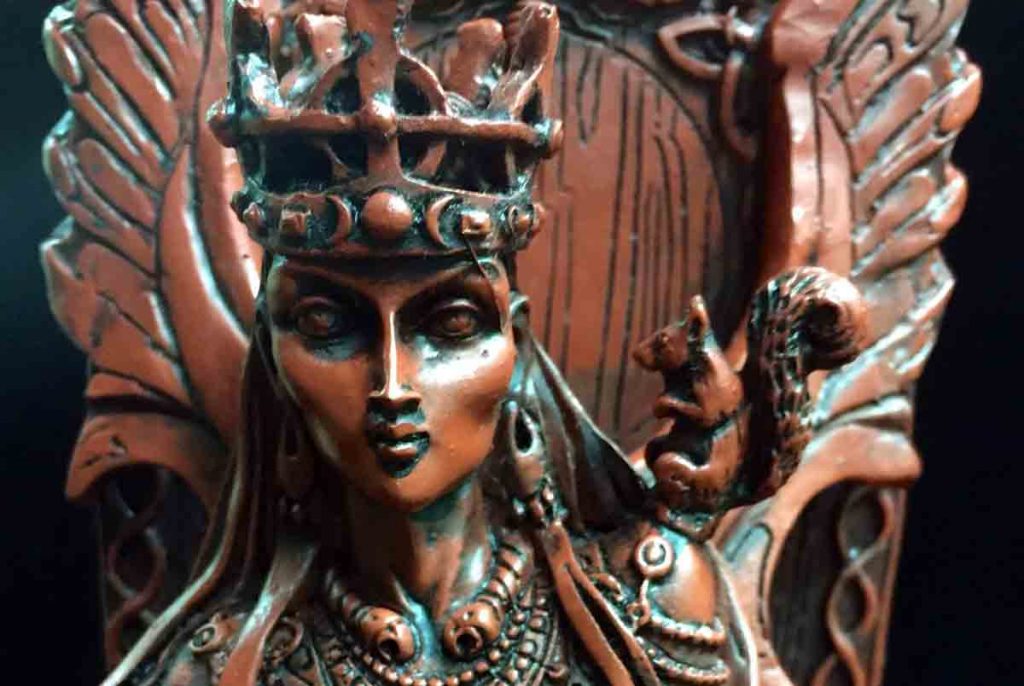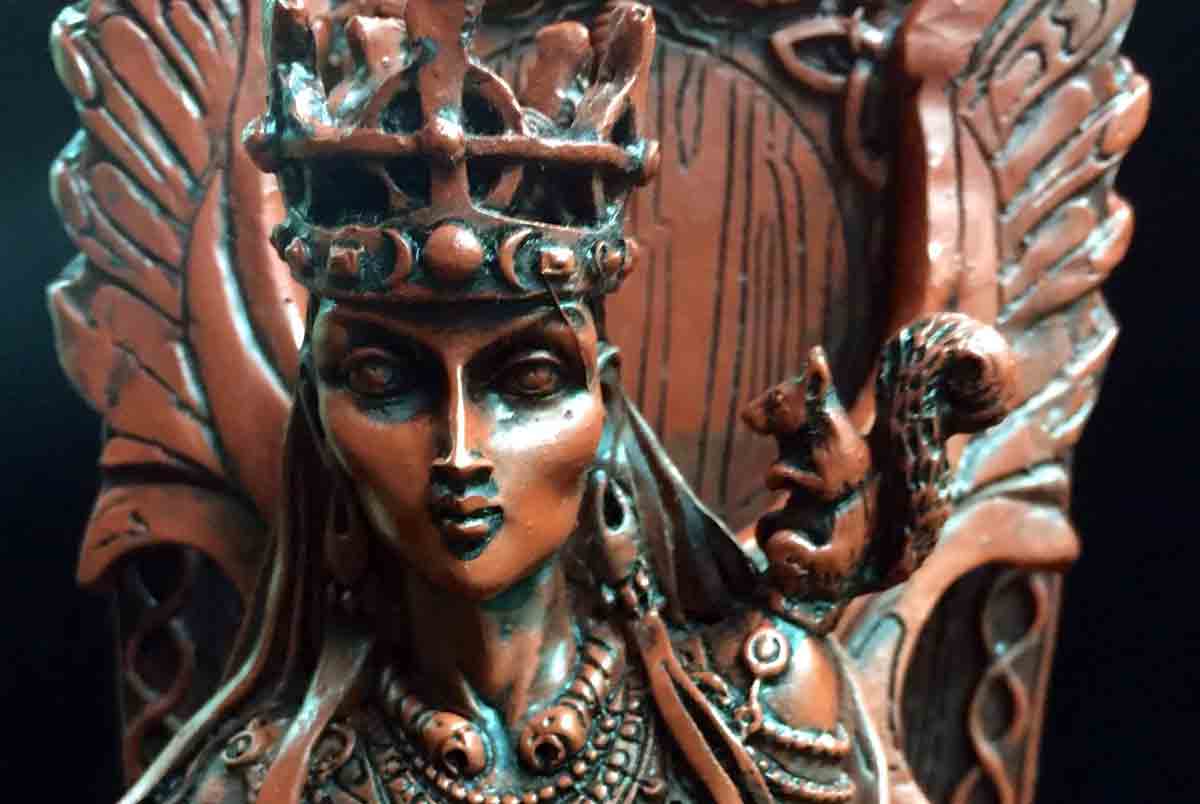Searching for a woman’s guide to revenge, infidelity, intoxication and death? ANN MASSEY tells us why we need look no further than some of Ireland’s goddesses for divine inspiration.
1. The Fury – Triple Goddesses Morrigan, Badb and Nemain
The sisters known as The Fury are war goddesses the Morrigan, Badb and Macha. They are the goddesses of battle, strife and sovereignty and harbingers of death for those men who crossed their path. The triple deities are most commonly known in the singular as The Morrigan, translated as Phantom Queen.
No corporeal weapons were needed in order for the Morrigan to take her prey. She relied solely on magic and her ability to shapeshift at will. Known primarily for appearing as a crow to those at death’s door, the goddess would also take on the guises of a hag where she would scream for the death of enemy troops, an old washer woman who is seen washing the clothes of those soldiers selected by her to die and a beautiful, seductive young woman.
2. Sorceress of the Tuatha Dé Danann
Bé Chuille was a sorceress of great regard and was one of the Tuatha Dé Danann, a master race of supernatural powers. Where mortal weapons would not work in battle, Bé Chuille was called upon to use her magic.
Carman, a vicious witch from Athens attempted to invade Ireland with her three evil sons, using the darkest of magic. Bé Chuille’s powers were pivotal in her downfall and death.
3. Áine – Cursed Stone, Healing and Vengeance
Áine was a daughter of the sea god Manannán. Although known throughout Limerick and Ireland for her healing nature and herbal remedies, there was a dark side to the goddess.
She had a special stone known as Cathair Áine, and any who sat upon it would begin to lose their minds and go insane. Any who sat on it three times would be lost forever.
The beautiful deity had many lovers and they would be consumed by her passion. Áine’s vengeful nature however was not to be treated lightly.
Oilill Olum was a King of Munster who raped Áine and she bit off his ear. His surname means ‘one eared’ and her action was well thought through, as this rendered him incomplete and by law, unable to continue as king.
4. Intoxicating Medb

Medb (pronounced Maeve) was the goddess of intoxication and another warrior goddess. Taking promiscuity to new heights, she would have upwards of twenty or thirty men in one night.
Kings would ‘wed’ her on their coronation day and complete the ritual by imbibing copious amounts of mead to ensure they would maintain their position of power.
One of Medb’s lover’s was a virile hero by the name of Fergus mac Roich, who was more than a match for the goddess’s sexual appetite. He turned traitor and joined her in the battle of Táin Bó Cúailnge against his fellow Ulstermen.
At one point in the height of attack, Medb needed to relieve herself and so urinated behind the shield of Fergus. It was said that three streams were created to form three waterways in order that mills could be built upon them.
5. The Divine Hag
Cailleach Beare is a crone goddess mostly associated in Ireland with the Beara Peninsula on the South West coast.
Her time of power is from Samhain to Beltane and she is the goddess of winter. She would raise brutal arctic storms, snow and ice and the hag carried a magic staff that turned the greenery she touched to the grey withered death of winter.
Her appearance is hideous and terrifying, blue face, long pointed teeth and filthy, bedraggled hair. As her season comes to a close, she turns into a block of stone until winter returns once more.
6. Boann, Reluctant River Goddess of the Boyne
With a name that translates as white cow, Boann was one of the Tuatha Dé Danann and married to the legendary King Nechtan.
Boann was committing adultery with a god known as Daghdha and so intent was she on keeping it a secret to avoid retribution, when she conceived, the deities made the sun stand still in the sky for nine months so her son Aengus was born on the same day.
Nechtan was the only person allowed to approach the Well of Wisdom, Connla’s Well. Furious that she was forbidden to go where her husband could, Boann stormed to the well and defiantly walked around it anti-clockwise as a mark of disrespect.
The waters surged and gushed out towards the sea, creating the River Boyne in the province of Leinster. Boann herself was violently swept away, losing an arm, a leg and an eye. These injuries proved fatal as her act of petulance cost Boann her life.
7. Aoibhell and the Deadly Harp
With a name meaning ardour, Aoibhell, guardian of the Dalcassians was always going to be passionate and demanding.
Her place of residence was on a grey rock overlooking the River Shannon, where she would hold regular midnight courts. The defendants would be husbands who were accused of not sexually satisfying their wives and Aoibhell would be judge, jury and executioner.
The goddess appeared to a young couple and in an effort to sway the male lover, offered him two hundred servants of the Sidhe in exchange for giving up his mortal woman and laying with Aoibhell. When he refused she disappeared in a sulk.
Aoibhell took a lover called Dubhlaing ua Artigan, a man who had fallen foul of his king. When he was reunited with his clansmen and went to battle, the goddess’s demands not to go were ignored. In order to protect him, Aoibhell wrapped a Druid cloak of invisibility around him which although effective, led Dubhlaing to be called a coward on the battle field.
When he tore it off, he was summoned to the furious Aoibhell who commanded he withdrew from fighting and offered him two hundred years of life by her side. He refused to be disloyal so she informed him his proud blood would spill across the field of war the following day. Both Dubhlaing and his king died.
Aoibhell also played a harp, which would mean imminent death to those who heard it. As the original protector of the O’Brien Clan, she has been the Banshee for all O’Briens ever since.
So if you ever wondered why Irish women were so strong, passionate and fiery, you need look no further than these compelling female deities – and if you were thinking of crossing one, remember hell hath no fury like a goddess scorned!



A fascinating and gutsy article; I really enjoyed readinv a out these astounding women of Irish history.
You forgot about Cliodhna! Queen of the Banshees!
Doesn’t get more vengeful than that!